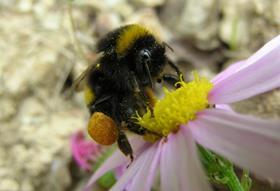
The same 2013 study used by the UK government to argue that neonicotinoid pesticides are no threat to bees has been re-examined by leading bee scientist Dave Goulson, who sees in the study conclusive evidence that they are in fact a threat, the Guardian has reported.
Scientists at Fera, the UK’s Food and Environment Research Agency, concluded from their study that bee hives “remained viable and productive in the presence of the neonicotinoid pesticides under these field conditions”.
However, Goulson, a professor of biology at the University of Sussex, said the experiment found that all hives where clothianidin, a common neonicotinoid, was present contained reduced numbers of queen bees.
“The conclusions they come to seem to be completely contrary to their own results section,” he said. “They find that 100 per cent of the time there is a negative relationship between how much pesticides were found in the nest and how well the nest performed, and they go on to conclude that the study shows that there isn’t a significant effect of pesticides on bee colonies. It doesn’t add up.”
According to the Guardian, the study was never published in a peer-reviewed journal and was rejected by the EU’s safety authority.
The UK’s Department of Environment, Food and Rural Affairs (Defra), on the other hand, cites it on its website as a basis for its support of the pesticides.
A spokesperson for Fera seemed to suggest that the conclusions drawn by the government were misguided. “In the executive summary of our 2013 report we clearly stated that our experiment lacked the power to reach any firm conclusions about the impact of seed coated neonicotinoid on bumblebee health,” he said. “Whilst there was an absence of evidence to support the hypothesis that neonicotinoids harm bees, this does not lead to the conclusion that they are benign.”
Yet former environment secretary Owen Paterson leant heavily on this research when making his case against the EU moratorium on neonicotinoids. The ban was introduced in 2013 despite the UK government’s unpopular stance.
Presumably, the government’s position proved more popular with the pesticide industry. Adding to the public’s suspicions was the fact that the lead author of the report left Fera just months after its publication to join Syngenta, a major producer of neonicotinoids.
Goulson suggested the government should reconsider basing policy on non-reviewed studies and expressed concern that “the same data set can be interpreted in such wildly contrasting ways by different scientists, for this is likely to undermine confidence amongst the general public in the scientific process”.



